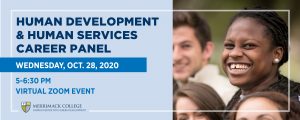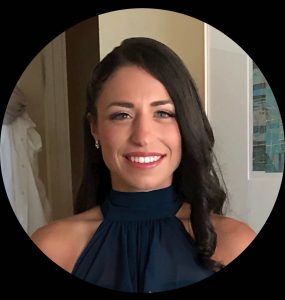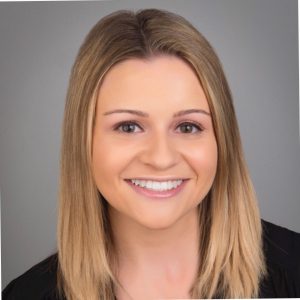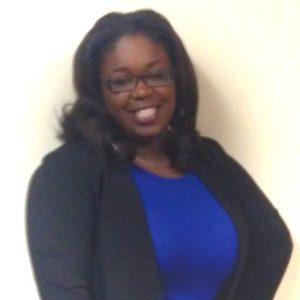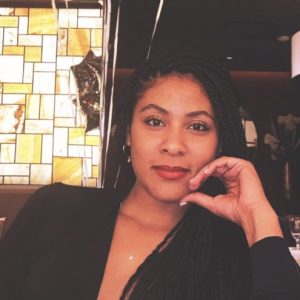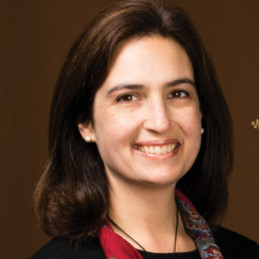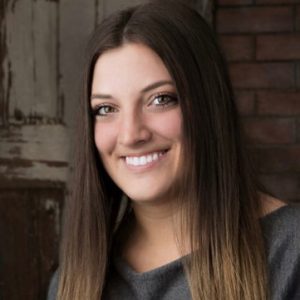On Oct. 28, the School of Education and Social Policy welcomed a panel of star-studded alumni back to Merrimack to tell the tale of their career journeys. The panel consisted of six professionals: Dr. Rachel Aghara, Amanda Hoover ’16, Jessica Lawrence M’20, Rachel Malieswski ’19, Katherine Neumann ’16 and Taisha White M’18. Sarah Mackler, assistant director and career advisor for the O’Brien Center, moderated the discussion alongside Dr. Laura Hsu and Dean Deb Margolis. Dr. Hsu made opening remarks, leading into the discussion by thanking the panelists.
“Sometimes, it’s hard for our students to understand what they can do in a concrete way,” Hsu said. “So we’re thrilled for you to be here tonight.” But our faculty weren’t the only ones excited.
“How long do I have?” asked Katherine Neumann, smiling through her introduction. As a licensed social worker for Women and Infants Hospital in Providence, RI, her role errs on the side of consulting, stepping in to screen and protect both mothers and children as needed. When asked how she became a social worker, she discussed her career path in more depth. She cited medical issues during her undergraduate career that pushed her towards social work.
“It was a blessing in disguise. I originally wanted to be a teacher … but I didn’t really want to be a teacher,” she admitted. “I like fast-paced work, and I love the interdisciplinary feel of the hospital — I feel like an integral part of the medical team.” Neumann faced some initial criticism over her career choice in social work, being told that she’d be living paycheck to paycheck. But in her role at the hospital, the pay certainly helps as well.
Another alum working in the medical field, Rachel Malieswski, discussed her more straightforward path. Malieswski spent her senior year volunteering at Boston Children’s Hospital — and she sees volunteering as vital to career exploration.
“It confirmed everything for me,” she said. She knew once she started that she’d stay in the field; she did, even securing a full-time position as a child life assistant at the same hospital. “Every day is so different, nothing is really black-or-white; that’s what I love about it.”
Taisha White agreed, describing her role at the Old Colony YMCA as a community liaison for teenagers as pretty similar.
“My role is a jack-of-all-trades role,” she said, laughing. White joined the panel from her office, gesturing to all the items behind her as just a few facets of her job. “What I get to do is super amazing. I work with teens from eighth grade, changing over into high school — I relive that with them.”
“I have a bachelor’s degree in business,” she continued. She discussed the journey she took after her undergraduate years, trying out different things and feeling frustrated when she couldn’t find the right fit. Even when a job interview went well, she’d decline offers that didn’t capture her vision. When she took on her liaison role at the YMCA, she was thrilled.
White’s struggle to find her niche resonated with fellow panelist, Amanda Hoover.
“I have completely used up my bachelor’s degree!” she said. “When I graduated, I didn’t know what I wanted to do, and it was stressful. I had to test the waters, so I found this whole vulnerable population, and I tried it. I kinda fell into it.” Hoover enjoys her job, and she stressed to current students that it’s okay not to know what you want right away. It takes time and exploration to figure out your ideal path. She now works with Central Boston Elder Services as an Adult Protective Services worker.
Two other panelists, Dr. Rachel Aghara and Rachel Malieswski, chimed in to discuss working with the other end of human services: child services.
“I work in early intervention, similar to Katherine,” Aghara said. “My career involves the educational system and the healthcare system all-in-one, so I get to work alongside so many different people.” Aghara serves as a bilingual speech-language pathologist at Vidya Associates, providing home services primarily and supporting caregivers. Her work has led her all over the country, and even internationally. “It’s so rewarding when it goes well.”
Malieswski added that in her role, and in child services, you’re often dealing with “the peak and the pit.” She discussed the intricacy of her role—often working with fragile, complex children—and how she aims for improvement over perfection. “I’m trying to give kids a chance at a better childhood,” she said. She, alongside many other panelists, cited realism as key. The panel as a whole agreed that human services emphasized coping and gradual healing over “fixing” a situation. In particular, Jessica Lawrence spoke on this.
“It’s the small things! You can fix the smallest thing and families are so grateful; it’s the best part.” Lawrence’s role as a school counselor brings her so much satisfaction, but even she agreed that huge, all-encompassing plans to “fix” someone’s life or situation aren’t realistic.
Several questions came to the panelists surrounding burnout. As many of these six deal with heavy mental health issues on the daily at their jobs, the audience wanted to know how that had affected the group, and what coping techniques they had for combating burnout.
“I’m annihilated when I get home,” Neumann said. “You need to do something that brings you back to the ground. And I remember: I can’t change the world. It’s important to remember that I can only control so much.”
“I’m extremely tired even right now,” Hoover admitted. “But it’s good to recognize that.” She echoed Neumann’s sentiments about leaving work out of her working hours. “I set boundaries. I turn my phone off at 5, and that’s it.”
But is burnout inherently bad? Can there be value to it? Taisha White seemed to think so.
“It has benefits—being burnt out. Me and my coworkers are burning out at the same time, and we’re realizing that. Okay, we’re burnt out. How are we gonna solve that? So we’re figuring out how to promote self-care among each other.” She listed ideas like staff luncheons, a better system for breaks during the day, more days off and shifted working hours. “You can say you’re burnt out—it’s normal! It sounds like complaining, but it’s really a debrief.”
As the night came to a close, Dr. Hsu asked our panelists to impart some final wisdom on the student audience.
Malieswski pointed out her experience, telling students to take on opportunities and ask plenty of questions. Lawrence agreed.
“Internships will give you experience, and so many connections,” she said. “The more I learned, the more comfortable I got — and that helped me land a job right out of college. Putting yourself out there works.”
“And don’t let yourself be scared of making the wrong decision,” Dr. Aghara added. “Give things a try. If you’re stuck on two or three options, try them! Just pick something — you’ll know if it’s your field or not.”
White agreed with this, referring again to her bachelor’s in business.“Don’t limit yourself to what your degree tells you to do.” She highlighted the chance of unexpected learning opportunities in jobs and internships; you may not like the field, but you could learn a few crucial skills along the way.
“I thought I wanted to be everything,” Hoover said. “What you do now might be different later on. Just don’t stress out — slow down, and take whatever opportunity you can.” And, most importantly: “If you ever want advice, please reach out!” Hoover, as well as the other panelists, made their LinkedIns available to any students interested in connecting. They emphasized continuing the dialogue, and keeping in touch, as networking had been so helpful in their journeys.
Dean Margolis and Dr. Hsu made closing remarks.“You don’t have to make a lifelong commitment to your next step,” Margolis said. Several panelists nodded along, with the statement neatly summing up the night of discussion. Margolis emphasized that things change — and the flexibility of education makes it possible to embrace that change.
“I never thought I’d be a teacher, but here I am,” added Dr. Hsu. She went on to thank the panelists, citing their ever-shifting journeys. “You all found your own way, and your own passion. It’s not a linear path. And to everyone here tonight: you’re one step closer to figuring out what you want to do.”
